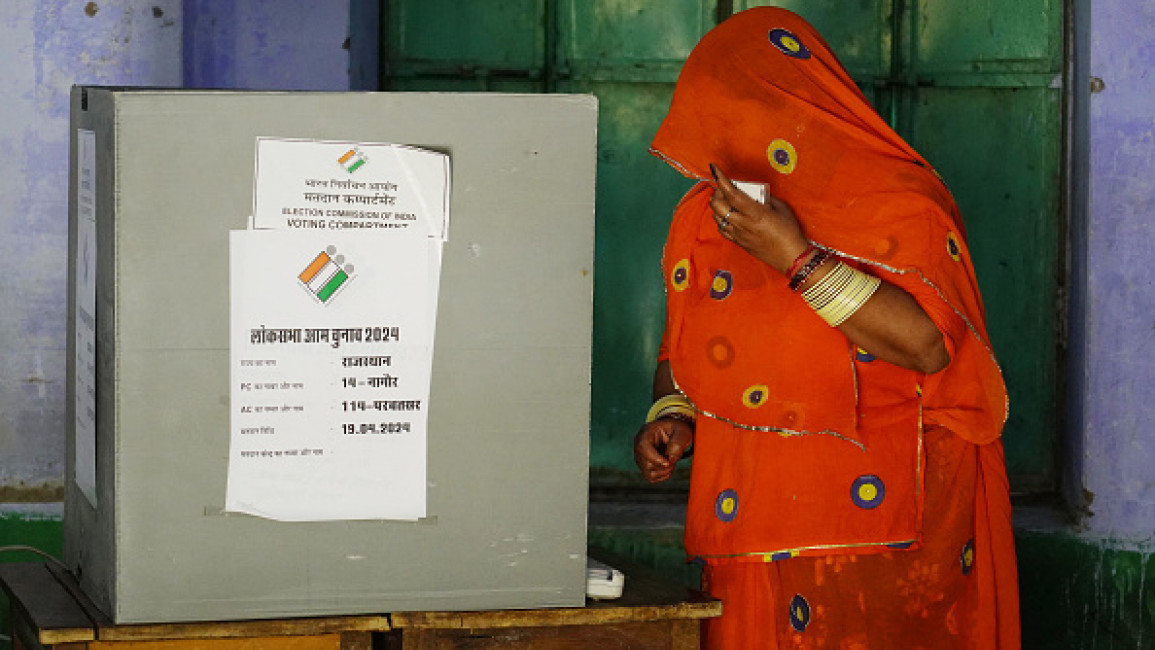India’s Lok Sabha election 2024: What you need to know
India is holding the world's biggest election starting this month, with nearly 1 billion people eligible to vote and Prime Minister Narendra Modi in the pole position.
What is it?
Elections to the 543 contested seats in the lower house of parliament, called the Lok Sabha, for a term of five years. To rule, a party or a coalition needs a simple majority of 272 seats. Prime Minister Narendra Modi's Bharatiya Janata Party (BJP) won 303 seats the last time, followed by 52 for the main opposition Indian National Congress (INC).
In addition to the contested seats, India's president can nominate up to two Anglo-Indians to the Lok Sabha.
Where and when is it taking place?
The elections will be conducted in seven phases partly to ensure sufficient security at polling booths across the vast country. Voters can make their choice by pressing a button on an electronic voting machine, first used in India in 1982 and more widely since the early 2000s.Votes will be counted on June 4 after polling is done on April 19, April 26, May 7, May 13, May 20, May 25 and June 1.
How does it work?
The world's most populous nation follows the first-past-the-post system, where voters cast a vote for a single candidate in a constituency and the candidate with the most votes wins the seat. The voting age is 18 years and contestants need to be at least 25 years old.
A total of 968 million voters are registered, out of which 497 million are men and 471 million are women. A higher percentage of women voters than men are likely to vote for the second time in a row.
Who are the main candidates?
Modi headlines the race, followed by his de facto deputy Amit Shah and the main opposition face, Rahul Gandhi of the Congress party. Gandhi's mother Sonia, the matriarch of the Nehru-Gandhi dynasty, is not contesting this time.
Why is it important?
Modi is chasing a record-equalling third straight term like India's first prime minister, Jawaharlal Nehru. Modi says another overwhelming victory for the National Democratic Alliance, led by the BJP, is crucial to meet his goal of lifting India to a developed economy by 2047 from middle-income levels. The world's fifth-largest economy has grown fast in the past few years and Modi has "guaranteed" to take it to the third position if he wins the election.
The BJP draws its support mainly from Hindus, who form 80% of the country's 1.42 billion people and for whom Modi earlier this year delivered on a key party promise of building a grand Hindu temple on a disputed site.
The opposition "INDIA" alliance, largely a centre-left grouping of more than two dozen disparate parties, says a victory for it is essential to save the country's democratic and secular setup, lift its marginalised communities, raise prices for farmers and create jobs for its young. Opinion polls, which have a mixed record in India, predict another thrashing of the Congress alliance at the hands of the BJP.
What are the key issues?
Inflation: In the past decade under Modi, the Indian economy has jumped five places to the fifth position in the world and he has "guaranteed" to lift it to third position should he win the election. Fruits of the booming economy, however, are more visible in the cities than in the vast countryside. A sharp price rise has also been a concern.
Welfare policies: Since the COVID-19 pandemic, the government has been giving free food rations to 814 million of India's 1.42 billion people. Some critics have said the fact that the government feels the need to support nearly 60% of India's population with free cereal is a sign of uneven economic growth in the country.
Corruption: A government agency that investigates suspected money laundering has summoned, questioned, raided or arrested nearly 150 opposition politicians in the past decade. In the same period, it has investigated only about half a dozen ruling party politicians.
Unemployment: Modi first came to power in 2014 partly on the promise of creating tens of millions of jobs for the country's youth but has largely failed to deliver. The unemployment rate rose to 8% in February, according to the privately held Centre for Monitoring Indian Economy.
Farmers: The BJP had promised to double farm income by 2022 in its manifesto for the last election, but there is no sign of that. Protesting farmers, especially from the northern state of Punjab, forced Modi in 2021 to roll back three farm reform laws, a rare policy reversal by him.
Hindu reawakening: Modi in January led the consecration of a grand temple to Hindu God-king Ram on a site believed to be his birthplace, fulfilling a 35-year-old promise of the Hindu-nationalist BJP. A Hindu mob in 1992 pulled down a 16th-century mosque on the site, which many Hindus believe was built over a demolished temple under the Mughal ruler Babur.
Modi's government has ended federal support for Muslim schools, or madrasas, and some BJP states have either closed many of them or are on the verge of doing so, despite opposition from Muslim leaders.
Modi has also implemented a citizenship law that has been criticised as discriminating against Muslims, granting nationality to Hindus, Parsis, Sikhs, Buddhists, Jains and Christians who fled to India due to religious persecution from Muslim-majority Afghanistan, Bangladesh and Pakistan before Dec. 31, 2014.


![Bahrain [getty] Bahrain [getty]](/sites/default/files/styles/image_330x185/public/media/images/5F28B59A-942B-4B6A-A5A8-09D476D1E68D.jpg?h=d1cb525d&itok=NJNXWh5z)
